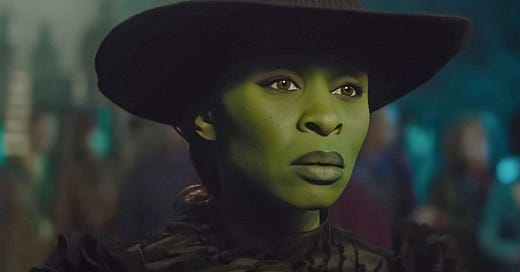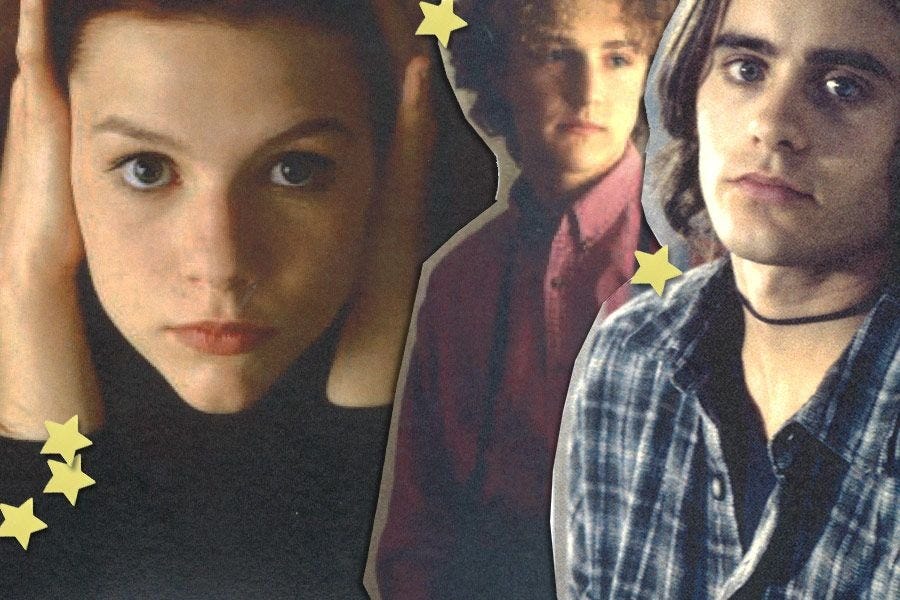The Wicked Witch Was A Wronged Teenage Girl
Winnie Holtzman, Wicked, My So-Called Life and her Legacy Creating Powerful Teenage Girls
I used to think endlessly about My So-Called Life when I first watched it in the 90s. I was in my early twenties, long past high school, but I still grappled with how little I communicated with boyfriends and friends, how many times I was untrue to myself because I was fearful that I was going to make a fool of myself or show too much emotion.
Angela Chase, My So-Called Life’s teenage heroine played eloquently by Claire Danes, knew how to profoundly speak to her friends, to the boy she was madly in love with, to her best friend who hurt her. At the time I wished I had been like Angela Chase in high school. I wish I had the words that she did to communicate those strong, explosive feelings. How did she find those words?
Of course it was because Angela Chase was written by an adult woman. An adult woman who could look back at her own short comings and awkward interactions with the right language. That adult woman was Winnie Holtzman. Angela Chase was a character. Not a real person. But I felt so connected to her, wished I could have been as eloquent about my heartbreak as she was.
I was shocked when I heard that Winnie Holzman also created Wicked. You might say to yourself, Wicked? One was a tv show about high school students. The other, Wicked, is the origin story of The Wicked Witch of the West and Glinda.
But Wicked is an origin story. And villain origin stories typically involve the villain starting out as innocent until society turns on them because of a manipulative evil leader. (See Maleficent, Joker, etc.) The Wicked Witch has a name if you didn’t know, and it’s Elphaba. Wicked is about Elphaba’s relationship to Glinda (Galinda) in their early college years, as teenage girls learning about themselves, their strengths and weakness, and what they’re capable of.
Elphaba is a heroine built in the frame work of Angela Chase. She’s trademark Holtzman. She’s insecure, an outcast, and wants to reject her past to move onto something brighter. She inhabits a powerful spirit that needs to be used properly. She has a strong moral center. She’s kind. She won’t tolerate injustice. Angela Chase is the same kind of character. She connects to the underdog, Ricky Vasquez, a queer, kind, latino kid; and the troubled yet ultra cool, popular girl, Rayanne Graff. She calls her mother when her friend O.D.’s. She connects with the homeless. She doesn’t care about popularity. She wants to be true to herself. She’s that girl, always doing the right thing, or at least feeling bad if she doesn’t.
I went to see Wicked last night with my 15-year-old daughter. Spoiler alert for Wicked. Don’t read further if you haven’t see it.
Elphaba starts out like Angela Chase. Quiet, introspective and timid. She meets Galinda at school, the popular, exciting, beautiful girl (like Rayanne Graph). And while Galinda loves Elphaba, she turns against her, just as Rayanne Graph turned against Angela. Elphaba threatens to expose the wizard for being a fake, she harnesses her powerful emotions and spirit, she sweeps her cape in the air and flies away on her broom, becoming one of the most powerful women on the planet.
I cried because I felt that I had been lied to. They told us from the time we were little that the Wicked Witch was bad. That she was evil and wanted to torment the people of Oz. But that’s not who she was.
The Wicked Witch was a wronged teenage girl.
Angela’s powers are harnessed in a more subtle way. In a Cyrano de Bergerac move, Jordan, the boy Angela loves but who she is betrayed by, asks Brian, the boy who loves Angela to write a love letter to her. She sees Brian on the street in her neighborhood and does what most teenage girls are unable to do in a moment of extreme embarrassment. She confronts him with the dark truth.
From My So-Called Life
Angela : Uh, Brian? Brian, look at me. Um, that letter I told you about. Um, Rickie said you wrote it. And I have to know because—
Brian : Know what? There's nothing to know. [pause] Okay, what, what Rickie probably meant is that, see, Jordan Catalano asked me to, like, proofread it for grammatical errors.
Angela : You proofread a love letter? Is this like a game to you?
Brian : Um, hardly.
Angela : But you admit that you were involved.
Brian : I'm not admitting anything.
Angela : This is a joke, right? That the, the two of... Oh God. I can't
believe I fell for it. It's obviously a total lie.
Brian : No, I meant every word. [pause] I mean, the person who wrote it
meant every word. Probably.
Angela : Brian?
Brian : I didn't write it.
Angela : But Brian, you said-
Brian : Forget what I said. Forget this whole conversation!
Angela : How?
Angela can’t just go back to Jordan, the boy she’s always loved, after learning Brian wrote the love letter. Even at the end of this episode (the last episode of the series), when Jordan leads her away, Angela leaves Brian with a gaze, telling him that something has changed within her. Telling us, the audience, that she’s been awakened.
The vulnerability is in Claire Danes’s acting, but more, it’s in the writing. Most portrayals of teenage girls include a girl confronting her crush or her enemy and then storming away. But here, Holtzman allows her young female characters to linger in their emotions. They don’t run away. They hold on to their power, they try to connect to a deeper understanding about life, and who they are in life. Yes, Elphaba flies away, but not without singing these lyrics:
From Defying Gravity:
Something has changed within me
Something is not the same
I'm through with playing by the rules of someone else's game
Too late for second-guessing
Too late to go back to sleep
It's time to trust my instincts, close my eyes and leap
She’s awake, realized and in control.
Thanks for reading. Would love to hear your thoughts.
-Hayley





